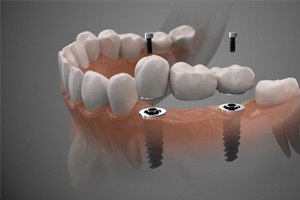
Dentures – Northborough, MA
Reliable, Natural-Looking Tooth Replacement

Dentures have already helped generations of patients to regain their lost teeth. Modern dentures are even more comfortable, functionable, and reliable than their predecessors. If you have lost multiple teeth, this treatment may be a viable option for you. In the following sections, you will learn more about what dentures are, how the treatment process works, and what you can expect from this type of tooth replacement.
Why Choose Northborough Dental Associates for Dentures?
- Highly experienced dental team
- Highly functional restorations
- Comfortable treatment in a welcoming atmosphere
Who Is a Good Candidate for Dentures?

At Northborough Dental Associates, we offer a number of tooth replacement solutions, including beautiful and functional dentures. This treatment might be right for you if you have lost multiple teeth and face daily inconveniences due to your condition. As long as your mouth is healthy enough to support a prosthetic, our team may be able to provide you with an attractive new smile in a matter of weeks! Continue reading below to learn more about candidacy for dentures.
Effects of Missing Teeth

Tooth loss can occur for various reasons, including decay, gum disease, and injury. Regardless of why you have an incomplete smile, you may face some challenges due to your condition. For example, you might feel self-conscious about your appearance due to gaps between your remaining natural teeth. Your cheeks might look hollow, causing you to appear older than you really are. You may also find it difficult to eat a variety of nutritious foods. Many people with missing teeth even have trouble speaking with clarity and ease. Fortunately, dentures may be able to help with all such issues.
What Qualifies You for Dentures?

You might be a candidate for dentures if:
- You have lost multiple teeth throughout one of your dental arches. If you have only lost one or two teeth, a different treatment may be more suited to your circumstances.
- Your gums and jawbone are healthy enough to support a prosthetic. You should be free of active gum disease and other conditions that might interfere with your ability to wear a denture.
- You want an efficient and cost-effective tooth replacement solution. Traditional dentures are one of the lowest-priced ways to replace missing teeth.
Alternative Tooth Replacement Options

If dentures are not quite right for you, you may qualify for an alternative tooth replacement solution, such as:
- A fixed bridge. A fixed dental bridge has a crown on each end, which get attached to the teeth that surround the site of a missing tooth. An artificial tooth is supported by the crowns in order to “bridge” the gap. Bridges are sturdy and can last for a decade or longer.
- Dental implants. Implants get surgically placed into the jawbone, where they serve as prosthetic tooth roots. They can support crowns, bridges, and dentures. We often recommend implants as the best form of tooth replacement because they are incredibly strong and can last for decades.
How Dentures Work

What Are Full and Partial Dentures?

There are two main categories of dentures:
- Full dentures replace an entire arch of missing teeth. They consist of a gum-colored base and a row of artificial teeth, which are usually made out of acrylic or porcelain. Natural suction or a mild adhesive helps a full denture to stay in place.
- Partial dentures replace multiple teeth throughout a dental arch. They fit in around the remaining natural teeth. Small metal attachments help partial dentures to remain secure during eating and speaking.
Benefits of Full and Partial Dentures

Some of the most noteworthy benefits of full and partial dentures include:
- Cost-effectiveness. Dentures tend to have a lower upfront price than other types of tooth replacement (such as dental implants).
- Caring for dentures is relatively simple and does not take a lot of time.
- You may have to adjust your eating habits a bit so you do not destabilize your new teeth while you are eating, but you should be able to enjoy almost any food.
- As long as you visit us periodically to get your dentures relined (adjusted), they should continue to fit well and feel comfortable throughout their lifespan.
Understanding the Cost of Dentures

In general, dentures are a relatively affordable form of tooth replacement. The exact cost of your denture will depend on a few factors, including the materials used to make it and how many teeth you are replacing. In many cases, dental insurance is willing to cover at least a portion of the cost of dentures. Low-interest financing is also available for most patients.
Factors that Affect the Cost of Dentures

Some factors that may affect the total cost of your denture treatment include:
- Preparatory care. If you require tooth extractions or gum disease treatment before you get dentures, they can add significantly to the cost of your care.
- The base of dentures is usually made of acrylic, whereas the teeth may be either acrylic or porcelain. The specific type of materials used, as well as their quality, have a bearing on price.
- The type of denture. Full, partial, and implant dentures all come at different price points.
If you ever come across a deal for “bargain” dentures, be very wary. Many patients have been sorely disappointed by such supposed deals. It is best to choose high-quality care right from the outset of your tooth replacement journey.
Are Implant Dentures More Expensive?

The upfront cost of implant dentures is significantly higher than that of traditional dentures. The price difference is due to the fact that the implant denture treatment procedure requires more time, money, and materials to complete.
Despite the relatively high cost, implant dentures are an excellent investment that might actually help you save money in the long run. They have the potential to last for many years. Traditional dentures, on the other hand, usually need to be replaced every 5 – 7 years or so. Their cost can add up very quickly over time! Plus, implant dentures offer superior functionality, strength, and other outstanding benefits.
Does Dental Insurance Cover Dentures?

In most cases, yes, dental insurance does cover dentures. Usually, they are deemed a major procedure, so up to 50% of their price may be covered (up to the amount of your policy’s annual maximum). Our team welcomes many different insurance plans, and we can help you figure out how your benefits apply, as well as what your out-of-pocket obligation will be. We will do everything we can to help you maximize your insurance.
Other Options for Making Dentures Affordable

Beyond insurance, there are a few provisions that you might be able to use to make your dentures easier to afford:
- Essential Dental plan. This discount plan, designed for patients without insurance, provides reduced fees for almost all of the services available at Northborough Dental Associates.
- The majority of patients are eligible for low-interest financing through a third-party lender, such as CareCredit or Sunbit. Our team can help you with the application process.
Are you interested in learning more about dentures and their cost? Contact our team today to request your tooth replacement consultation!
Dentures FAQs
Are you interested in getting dentures? Our Northborough dental team would be delighted to consult with you and answer all of your questions about the road ahead. In the meantime, though, you may find it beneficial to review the following list of FAQs. The information you find here can help you to have realistic expectations for your tooth replacement journey.
How Long Will You Have to Wait to Get Dentures After Your Teeth Are Pulled?
That depends on your circumstances and preferences.
Some patients are eligible to receive immediate dentures, which are prepared prior to tooth extractions and wearable right away after the natural teeth are removed. The fit of these tends to change rather quickly, so they do not last as long as conventional dentures.
The average wait time for conventional dentures is 6 – 8 weeks. This gives the gums time to heal.
For implant dentures, it could be a few months between tooth extractions and implant placement.
During your consultation, we can give you an estimate for the timeline of your treatment journey.
Should I Have All My Teeth Pulled to Get Dentures?
We try to help patients preserve their natural teeth whenever possible. Therefore, if your remaining teeth are still somewhat healthy, we may provide you with a partial denture to fit in around them to replace your missing dentition.
However, if your natural teeth are severely weak or damaged, or you have advanced gum disease, it may be best to get them extracted before you get dentures.
Can I Sleep with My Dentures?
When you first receive your dentures, we might recommend that you wear them for a full 24 hours. After that, however, it is best to remove your dentures at bedtime so your gums can rest overnight. Removing your dentures promotes improved circulation in your mouth and allows for more thorough oral hygiene.
If you wish to keep your dentures in your mouth around the clock, ask us if you are a candidate for fixed implant dentures.
What Is the Average Age for Dentures?
Dentures can be useful for adults of virtually any age; after all, even some young people encounter circumstances that cause significant tooth loss. Accidents, genetics, and certain lifestyle factors can all contribute to edentulism (the state of being toothless) at any point in a person’s life.
Generally speaking, though, dentures are more common among older individuals. That is simply because senior adults are more prone to health problems that contribute to tooth loss, such as gum disease. According to one estimate, around 57% of people ages 65 – 74 wear some type of denture.